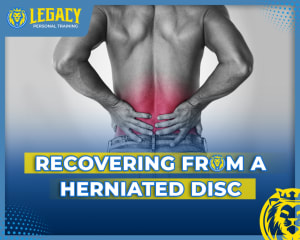
Recovering From A Herniated Disc
When dealing with a herniated disc, the traditional advice often leans towards rest and minimal physical activity. However, recent developments in physical therapy protocols suggest a more active approach, highlighting the importance of strength training over just resting. This shift in treatment strategy is based on the understanding that while rest can alleviate immediate pain, strength training provides long-term benefits in the recovery and prevention of back pain associated with herniated discs.
Understanding the Limitations of Rest
Rest is often the first line of defense against the pain of a herniated disc. While it can be effective in reducing acute pain and inflammation, prolonged rest has its drawbacks:
Muscle Atrophy: Extended periods of inactivity can lead to muscle weakening and atrophy, particularly in the core and back muscles that support the spine.
Reduced Flexibility: Lack of movement can result in stiffness and reduced flexibility, further exacerbating back issues.
Delayed Healing: While rest is crucial in the acute phase, prolonged inactivity can actually slow down the healing process by reducing blood flow and nutrient delivery to the affected area. While resting the injured area is advised, being sedentary is not.
The Advantages of Strength Training
In contrast to resting, strength training offers several advantages for those recovering from a herniated disc:
1. Enhanced Muscle Support: Strength training, particularly for the core and back muscles, provides better support for the spine. This support can alleviate the pressure on the herniated disc, reducing pain and aiding in healing.
2. Improved Blood Circulation: Exercise promotes blood flow, which is vital for delivering nutrients to the injured area, thus facilitating the healing process.
3. Increased Flexibility and Mobility: Regular movement and exercise help maintain joint flexibility and prevent the stiffness associated with prolonged rest.
4. Prevention of Future Injuries: A stronger back is more resilient against future strains and injuries, reducing the likelihood of recurrent herniated disc problems.
5. Mental Health Benefits: Engaging in physical activity can also have positive effects on mental health, reducing the risk of depression and anxiety that often accompany long-term back pain and immobility.
Implementing Strength Training Safely
While the benefits of strength training are clear, it's crucial to approach it correctly.
Gradual Progression: Start with low-impact exercises and gradually increase intensity under the guidance of a physical therapist or a qualified trainer. This approach ensures that you do not overstrain the injured area.
Focus on Core Strengthening: Core exercises are particularly beneficial as they strengthen the muscles around your spine, providing stability and reducing the load on your discs.
Use Proper Technique: Incorrect exercise form can do more harm than good. It's essential to learn the correct technique, preferably under professional supervision, to ensure that you're not putting undue stress on your back.
Listen to Your Body: Pay attention to your body's signals. If a particular exercise causes pain, choose an alternative exercise that works the same muscle group. Very rarely does more pain actually translate to more gain, especially when it comes to a back injury.
The paradigm shift from resting to active recovery through strength training marks a significant advancement in treating herniated disc injuries. By strengthening the muscles that support the spine, improving flexibility, and enhancing overall spinal health, strength training not only aids in the recovery process but also plays a crucial role in preventing future back problems. However, it's important to approach this transition carefully and under professional guidance to ensure safety and effectiveness. With the right approach, strength training can be a powerful tool in overcoming herniated disc injuries and maintaining a healthy back.
Take the Next Step Towards Recovery
If you've experienced a back injury, whether it's a recent occurrence or a lingering issue from the past, you don't have to navigate your recovery journey alone. At Legacy Personal Training, we understand the challenges and fears that come with back injuries, especially herniated discs. Our expert training team is dedicated to helping you move forward, offering personalized programs that not only aid in your recovery but also protect and strengthen your back for the future.
Schedule a Consultation Today

